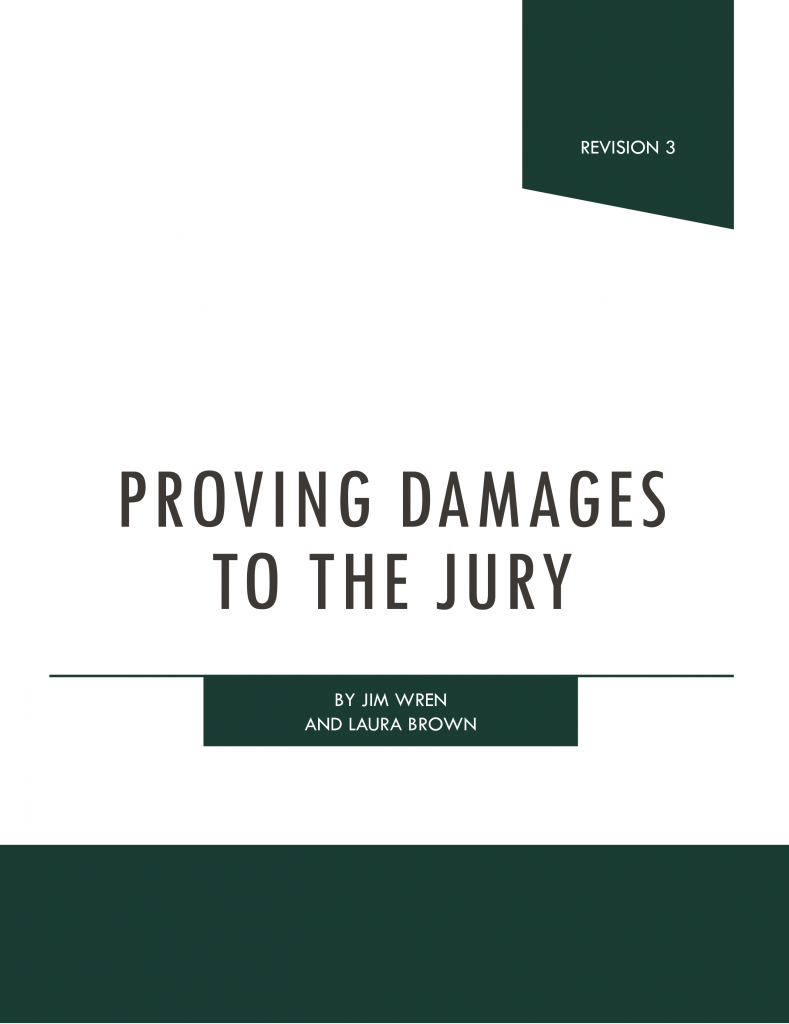Proving Damages to the Jury

Table of Contents
Part 1: How to Create the Story for Damages
- Chapter 1: Why Jurors Assess Big Damages
- Chapter 2: Credibility Is Vital for Maximizing Damages
- Chapter 3: How to Frame the Damages Story
- Chapter 4: Delving Into the Story
Part 2: How to Build the Right Damage Model
- Chapter 5: Client Interview and Investigation
- Chapter 6: Valuations and Damage Models
- Chapter 7: Damage Experts and Daubert/Frye Issues
- Chapter 8: Working With Damages Experts
- Chapter 9: Valuation of Intangible Damages
Part 3: How to Prepare the Damage Case for Trial
- Chapter 10: Discovery Tactics to Maximize Damages
- Chapter 11: Developing Your Visual Strategy
- Chapter 12: Testing Damages Before Trial
Part 4: How to Prove Damages in Trial
- Chapter13: Group Formation with the Jury
- Chapter 14: Voir Dire
- Chapter 15: Opening Statement
- Chapter 16: Direct Examination
- Chapter 17: Cross Examination
Part 5: How to Handle Unique Issues in Damage Cases
- Chapter 18: Closing Argument
- Chapter 19: Punitive Damages
- Chapter 20: Confronting Difficult Fact Issues
- Chapter 21: Scientific Proof of Brain Injury
- Chapter 22: Economic Loss Rule
- Chapter 23: Other Legal Battles on Damages
Bibliography
Table of Statutes
Table of Cases
Index
With this new edition of Proving Damages to the Jury, we are pleased to welcome a co-author: Laura Brown, a partner in Williams & Brown. Together, author Jim Wren and Ms. Brown and have updated the book with new and expanded coverage of a broad range of substantive topics and practical advice, including:
Client Interview and Investigation
- Topics to review with your client at your initial meeting, in personal injury and wrongful
death cases. - In a wrongful death case, how and when to approach family or close friends with a request
for photos/videos of the deceased.
Valuations and Damage Models
- Updated tables for all five steps for computing lost earnings and earning capacity in a per-
sonal injury or wrongful death case.
Damage Experts and Daubert/Frye Issues
- Discoverability of experts’ “draft reports,” notes, outlines, memoranda and emails.
- The analysis applicable to opinions based on technical and other specialized knowledge may differ even among jurisdictions that adhere to Daubert, depending on whether the jurisdiction also has adopted Kumho.
Working With Damage Experts
- How and why to research an expert’s testifying history.
- Tips for how best to provide records to your life care planner expert.
- Challenges of qualifying an expert to express an opinion on life-expectancy.
Developing Your Visual Strategy
- Putting the visual story together, so that each phase of your damages story is represented.
- When and how to make the most effective use of PowerPoint presentations.
- Practical tips for using foam boards, notepad flip charts, and animations or interactive visuals.
- How spending time with your client’s family members, friends and caregivers can help you develop the anecdotal story of your case and the visuals to support that story.
- The importance of choosing the right color scheme for your visuals.
Confronting Difficult Fact Issues, including:
- Pre-existing conditions.
- Loss of consortium.
- Vicarious liability.
Scientific Proof of Brain Injury
- Use of Double-Pulsed-Field Gradient MRI (dPFG MRI).
- Recent cases upholding the admissibility of Diffusion Tensor Imaging (DTI) findings and testimony as reliable.



